College students may start taking general education math and English classes more seriously soon.
The Florida Senate presented a bill on educational funding to Gov. Charlie Crist Friday. The bill will automatically pass if not signed by Crist on May 30.
If approved, SB 1676 will go into effect July 1, according to the Florida Senate Web site.
The bill will repeal the College Level Academic Skills Test administered to students who did not prove competency in communication and mathematics through general education English and math courses, according to UF's Office of the University Registrar Web site.
Mostly affecting the funding for virtual schools and grade school issues, the bill contains one item that directly affects college students.
Students will not be able to earn an associate's degree or progress to upper-division work in a college or university without proving that they have college-level communication and mathematic skills, said UF CLAST Administrator Winifred Cooke.
Not all students have to take the exam, which is comparable to the SAT or ACT.
Most students are exempt through test scores or by earning a cumulative GPA of at least a 2.5 in specified communication and math classes, Cooke said.
"I didn't know what the CLAST was or that we needed anything but a passing grade in those classes until I had a hold on my student record to take the exam," said Sinteria Cooper, a health education and behavior junior at UF.
Cooper plans on taking the test this summer.
"They say you need a C, but they don't really say anything about the 2.5 GPA," she said.
The bill may sound like good news to students because it removes a test, but it does not remove the requirement that students must prove their ability in communication and computation.
Cooper is happy to see the test go but only if UF informs students of the ways they can be exempted from it before a hold is placed on their record.
If students do not satisfy the CLAST requirements after earning 60 credits, a hold will appear on their record. According to UF's Office of the University Registrar, students will not be able to register for classes if CLAST requirements are not met by the time they receive 96 credits.
Students who could have taken the CLAST will be able to verify their skills by retaking the courses that exempt students from the test.
Receiving a score of at least 500 on the SAT math and verbal portions, or a score of at least 22 on the ACT reading portion and 21 on the ACT English and math portions may also exempt students, according to UF's CLAST exam alternative methods.
"I do not see how the repeal could be helpful for students, because when enacted into law (they) will have one less alternative for demonstrating their skills," said Cooke.
The CLAST will still be administered on paper on June 6 before possibly becoming inactive July 1.
UF, which has had the right to develop and administer the exam statewide since 1996, will add times for the students to take the computerized version of the test during June if the bill is passed, Cooke said.





